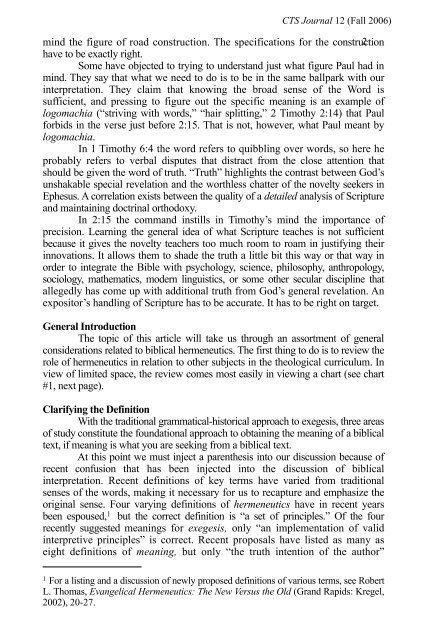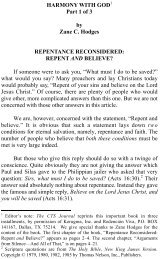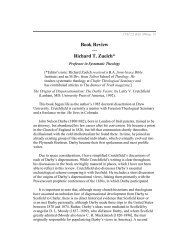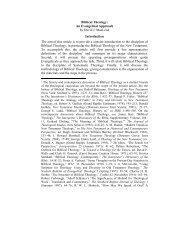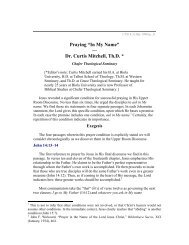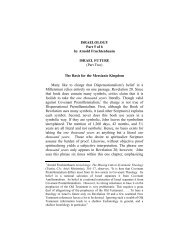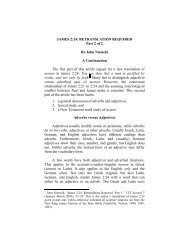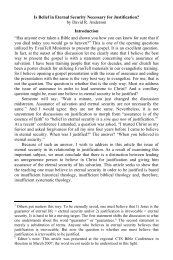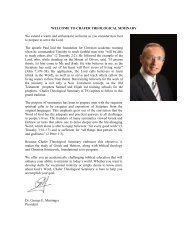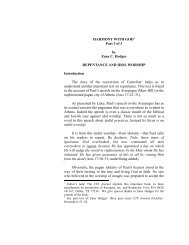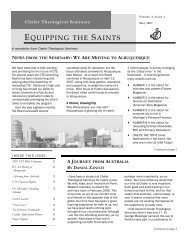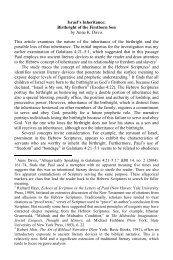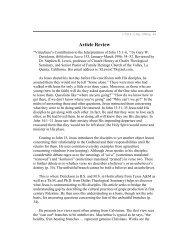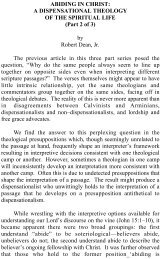BIBLICAL HERMENEUTICS - Chafer Theological Seminary
BIBLICAL HERMENEUTICS - Chafer Theological Seminary
BIBLICAL HERMENEUTICS - Chafer Theological Seminary
Create successful ePaper yourself
Turn your PDF publications into a flip-book with our unique Google optimized e-Paper software.
CTS Journal 12 (Fall 2006)<br />
mind the figure of road construction. The specifications for the construction 2<br />
have to be exactly right.<br />
Some have objected to trying to understand just what figure Paul had in<br />
mind. They say that what we need to do is to be in the same ballpark with our<br />
interpretation. They claim that knowing the broad sense of the Word is<br />
sufficient, and pressing to figure out the specific meaning is an example of<br />
logomachia (“striving with words,” “hair splitting,” 2 Timothy 2:14) that Paul<br />
forbids in the verse just before 2:15. That is not, however, what Paul meant by<br />
logomachia.<br />
In 1 Timothy 6:4 the word refers to quibbling over words, so here he<br />
probably refers to verbal disputes that distract from the close attention that<br />
should be given the word of truth. “Truth” highlights the contrast between God’s<br />
unshakable special revelation and the worthless chatter of the novelty seekers in<br />
Ephesus. A correlation exists between the quality of a detailed analysis of Scripture<br />
and maintaining doctrinal orthodoxy.<br />
In 2:15 the command instills in Timothy’s mind the importance of<br />
precision. Learning the general idea of what Scripture teaches is not sufficient<br />
because it gives the novelty teachers too much room to roam in justifying their<br />
innovations. It allows them to shade the truth a little bit this way or that way in<br />
order to integrate the Bible with psychology, science, philosophy, anthropology,<br />
sociology, mathematics, modern linguistics, or some other secular discipline that<br />
allegedly has come up with additional truth from God’s general revelation. An<br />
expositor’s handling of Scripture has to be accurate. It has to be right on target.<br />
General Introduction<br />
The topic of this article will take us through an assortment of general<br />
considerations related to biblical hermeneutics. The first thing to do is to review the<br />
role of hermeneutics in relation to other subjects in the theological curriculum. In<br />
view of limited space, the review comes most easily in viewing a chart (see chart<br />
#1, next page).<br />
Clarifying the Definition<br />
With the traditional grammatical-historical approach to exegesis, three areas<br />
of study constitute the foundational approach to obtaining the meaning of a biblical<br />
text, if meaning is what you are seeking from a biblical text.<br />
At this point we must inject a parenthesis into our discussion because of<br />
recent confusion that has been injected into the discussion of biblical<br />
interpretation. Recent definitions of key terms have varied from traditional<br />
senses of the words, making it necessary for us to recapture and emphasize the<br />
original sense. Four varying definitions of hermeneutics have in recent years<br />
been espoused, 1 but the correct definition is “a set of principles.” Of the four<br />
recently suggested meanings for exegesis, only “an implementation of valid<br />
interpretive principles” is correct. Recent proposals have listed as many as<br />
eight definitions of meaning, but only “the truth intention of the author”<br />
1<br />
For a listing and a discussion of newly proposed definitions of various terms, see Robert<br />
L. Thomas, Evangelical Hermeneutics: The New Versus the Old (Grand Rapids: Kregel,<br />
2002), 20-27.


